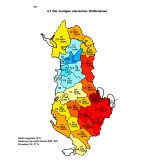Johane Derite
Regular Member
- Messages
- 1,850
- Reaction score
- 885
- Points
- 113
- Y-DNA haplogroup
- E-V13>Z5018>FGC33625
- mtDNA haplogroup
- U1a1a
There you go, non-Albanian speaking Ottoman.
North Westerners used �isht� (and still use) together with Labs, Chams, Arvanites, and Arbereshe, while Kosovo never used it, having ��sht� and ���. Then North West highland dialects must have received the �nsht and � as opposed to the more archaic �isht�, showing an East-West difference in both Gheg and Tosk, with the Westerners (both Gheg and Tosk speakers) having common archaic features shared between themselves.
Kosovo dialect lacks the variations of North Albania and Montenegro because it�s an Ottoman mediated expansion. Our clans� names became your dominant surnames with people carrying Kelmendi, Shala, Krasniqi, Hoti, Thaci, Berisha, Gashi.
Thus your autistic theory suggests that Proto-Albanians completely abandoned Dardania and returned during the Ottoman occupation again.
I have never mentioned the medieval period and it is totally irrelevant to the proto-Albanian expansion which seems to have come from Dardania. You seem to have some pathological hate for Northeast Gegës and are projecting your barbarian weakling pathologies on them.
Seethe harder, cope harder, barbarian chimp.








